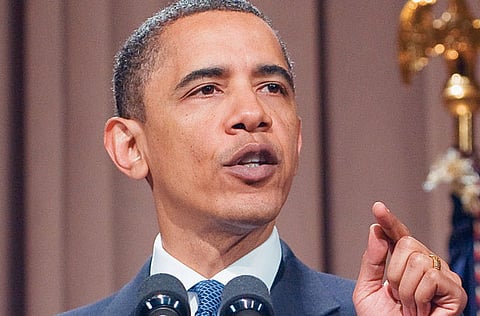Obama too weak to make peace in the Middle East
Doha Debates find Barack Obama too weak to make peace in the Middle East

US President Barack Obama is too weak to make peace in the Middle East, a popular debate in Doha has said.
A majority of 58 per cent of the participants at the Doha Debates, an Oxford Union-style debate, on Monday evening supported the motion that Obama did not have enough strength to make peace in the troubled region.
Ahmad Moussalli, a professor, and Philip Weiss, a journalist, defended the motion that Obama was too weak, while Roger Cohen, a columnist and author, and Sami Abu Roza, a political analyst, spoke against it.
Mousalli made his case by pointing out that he wished he was on the other side because he actually wanted the “surge of hope” given by Obama after becoming president to continue.
“However, what we are going to see is another phase of garbage collection by negotiations, if they take place, and allow Palestinians to recycle it,” said Mousalli, a professor at American University of Beirut.
“He is weak in a way he is seeking only an implementation. His government’s line that the [Israeli] colonies are illegal is nothing new. I think he’s going to be a one-term president, as the three presidents who did something towards a serious resolution of the conflict, before him, were not re-elected,” he was quoted as saying by Qatari daily Gulf Times.
Moussali said that Obama did not have the ability to deliver and that nothing had improved on the Palestinian front while Israel had continued its occupation, with more cruelty and arrogance.
“If Obama is serious about resolving the conflict, let him impose sanctions on Israel and cut down the aid that US has been giving to Israel above and under the table,” said Moussali.
However, Cohen, a New York Times columnist, fiercely opposed the idea that Obama was weak and told the audience that “here’s a man who has overcome impossible barriers and his toughness has trumped the naysayers again and again.”
“This president is a tough realist. He’s now identified as a vital US national security interest to achieve peace between Palestine and Israel. A vital national security interest,” he said.
Cohen said that under Obama, the US government has made a policy shift from being Israel’s lawyer to becoming an honest broker.
“Obama can’t make Israel abandon its 43-year-old policy. This is wrong. The facts are changing. President Obama is strong and he is a change agent,” Cohen said and expressed hope that the US would force Israel to stop the colonies as the proximity talks begin “in a few weeks.”
But Weiss, another journalist, held a different view.
“I believe in Obama as Roger [Cohen] does and in June I was in Cairo and heard him speak about the cruelty and intolerable treatment of Palestinians. I saw the excitement in Cairo and I believed in him. But, nothing has happened in a year after Obama’s speech in Cairo," Weiss said. "Israel continues its colonisation of Palestine…. Obama was successful in his healthcare policy because there is great political space in my country that supports a debate on the issue. That space is lacking when it comes to Palestine … Ahmad [Mousalli] and I are not allowed to speak in that space and each time we do, the Israel lobby rears up. The only person who has been his advocate is Gen. Petreaus. That is how narrow this space is in the US,” he said.
According to Weiss, “there is one weapon that the US can effectively use to discipline Israel: aid."
"But Obama is not using it, which speaks about his weaknesses,” he said.
Roza, spoke against the motion and defended Obama, saying that despite a lot of scepticism and cynicism that existed in the region, he saw in him a different presidential leadership surrounded by advisers attached to reality, rather than ideologically-driven.
“I think these officials have intentionally started to provoke a debate and create a lot of stress and heat among wider public domain. What Obama has done really well was to point at the settlements knowing that they were true drivers of Israeli policy,” Roza said.
“He has actually reframed the conflict about the land and the freedom for the Palestinian people. It’s a logical position and is also shared by Palestinian people,” he said.
The debate was moderated by award-winning journalist and The Doha Debates chairman Tim Sebastian who said they picked the subject after Israel had rejected Obama’s call for a total freeze on colony building.



